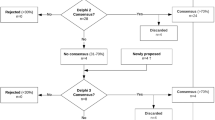Abstract
The information of the patient in the early stages after his spinal cord injury is often deficient. The opinion of 60 patients regarding some aspects of the information given to them during these early stages is discussed. The actual approach of patients with acute traumatic para- and tetraplegia, providing early detailed information and including a psychological interview, is presented.
Similar content being viewed by others
Log in or create a free account to read this content
Gain free access to this article, as well as selected content from this journal and more on nature.com
or
References
Betts, H B & Rosen, J (1969). Spinal Cord Injuries, edited by D. Ruge. Charles C. Thomas. Pp. 167.
Günther, M S (1969). Spinal Cord Injuries, edited by D. Ruge. Charles C. Thomas. Pp. 93.
Guttmann, Sir L (1973). Spinal Cord Injuries. Blackwell Scientific Publications.
Harris, P, Patel, S S, Greer, W & Naughton, J A L (1973). Psychological and social reactions to acute spinal paralysis. Paraplegia, 11, 132–137.
Kerr, W G & Thompson, M A (1972). Acceptance of disability of sudden onset in paraplegia. Paraplegia, 10, 94–103.
Michaelis, L S (1973). Personal Communication.
Naughton, J A L (1963). Psychological Readjustment to Severe Physical Disability in Spinal Cord Injuries, Roy. Coll. Surgeons, Edinburgh, pp. 135–138.
Author information
Authors and Affiliations
Rights and permissions
About this article
Cite this article
Braakman, R., Orbaan, I. & Blaauw-van Dishoeck, M. Information in the early stages after spinal cord injury. Spinal Cord 14, 95–99 (1976). https://doi.org/10.1038/sc.1976.15
Issue date:
DOI: https://doi.org/10.1038/sc.1976.15
This article is cited by
-
Mentality and behaviour of the Central European
Acta Neurochirurgica (1995)


